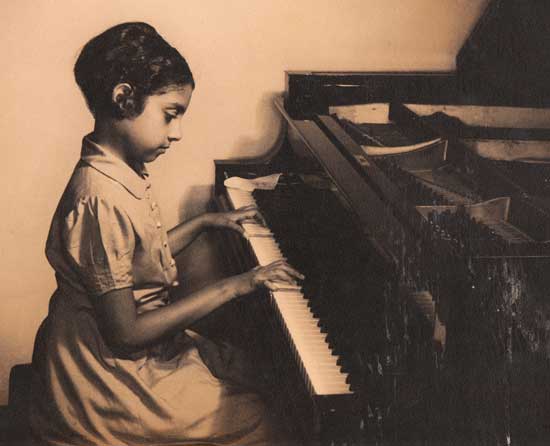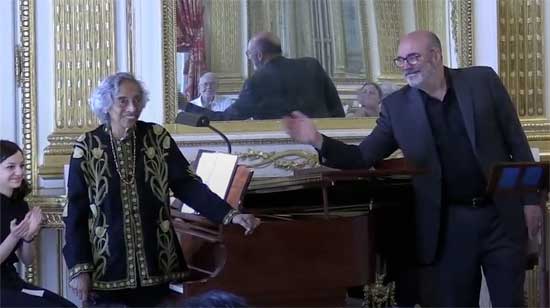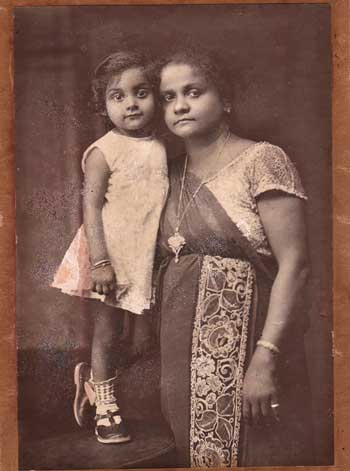A lioness in summer
Malinee Jayasinghe-Peris’s solo recital at the Women’s International Club in Colombo as a 12-year-old may well have had the blessings of the gods. Her piano teacher, Alix Cockburn, insisted the stage be adorned with coconut flowers and altar lamps “to keep away evil spirits and the thoughts of jealous music teachers,” Malinee recalls with a laugh. Lionel Wendt asked that she wear a bottle green dress and photographed her for the occasion. She performed works by Mozart, Beethoven and CPE Bach.
The hall was packed and her debut richly praised in the newspapers. Still a frequently impish 95-year-old, Malinee says, “As a 12-year-old, I was more interested in the new dress.” At the back of Malinee’s mind was also the prospect of being treated to one of her teacher’s superb desserts. Cockburn, an eccentric but excellent teacher, used disciplinary methods that were both carrot cake and stick. When Malinee was in her late teens, her teacher made her stand outside the gate as punishment for not having practised. “The boys at Pembroke Academy used to hoot at me,” Malinee says. Her father decided to move her to another teacher.

Child prodigy: Malinee's first recital in Colombo
Soon after, Malinee would leave Sri Lanka to study at the Royal College of Music in London. While studying there, she was introduced to Louis Kentner, a Hungarian pianist and brother-in-law of the legendary violinist Yehudi Menuhin. Kentner would be her mentor for a couple of decades. He and his wife took her on many holidays to Gstaad where she often practised with both Menuhin and Kentner. Kentner enraged Malinee’s husband-to-be, Douglas de Silva, who went on to become a senior diplomat and work with the World Bank, when he told him he shouldn’t marry her because he would be wasting her time.
Last September, to honour Kentner and Cockburn, Malinee underwrote a memorable concert at the Lionel Wendt theatre by the Chamber Music Society of Colombo and Sujeeva Hapugalle, the US-based Sri Lankan pianist. The CMSC’s forthcoming concert on May 7 is sponsored in part by Malinee in memory of her parents, Frances E. Jayasinghe (who was her first music teacher) and Herbert W. Peris.
Over the course of an interview over Zoom and subsequent email conversations, Malinee often comes across as seemingly ageless. She still teaches three undergraduate students at the George Washington University in Washington DC and practises 40 to 50 minutes a day, a third of a 72-minute programme that includes two Scarlatti sonatas, a Bach prelude and a short scherzo from a Beethoven sonata, and Of Foreign Lands and People and Traumerei from Schumann’s Kinderszenen. It is hard not to see this daily practice as autobiographical scenes from her distinguished career. It includes Ravel’s Ondine from the devilishly difficult Gaspard de la Nuit that she recorded in an acclaimed vinyl collection as well as Oscar Chavez’s playful La Cucaracha. When her vinyl LP was released in the late sixties, a Washington Post critic observed of the daunting ambition of recording L’isle Joyeuse by Debussy, Falla’s Fantasia Baetica and Ravel’s entire Gaspard de la Nuit, that “in her appearances in Washington, Miss Peris has in Chopin and in Mozart (taken) the more intimate and delicate side of the piano (to) make it a thing of singular poetry. That she can also take on some of the largest hurdles for the piano says something of the tremendous power concealed in this charming young woman.”

Aged 94: Her most recent concert with tenor Robert Baker in Washington DC
In conversation, her pathbreaking career as a South Asian western classical musician, akin to Zubin Mehta’s as a conductor, frequently becomes a backdrop to technicoloured reminiscences of her childhood in Sri Lanka. She begins by joking that “I don’t advise people to grow old.” Despite having fallen off her computer chair and waited unsuccessfully for an electrocardiogram test in the hospital till 1a.m. the night before we speak, she embodies lessons in defying the aging process. Her daily routine is jammed with seated qi gong practice, half an hour refreshing her French on YouTube and Lumosity brain training games – and, if her interview is any indication, gales of laughter. “For pleasure, I play the slow movements of Beethoven sonatas,” she says. “That’s my day!”
She jokes about dropping a fraction below the 95th percentile on mental acuity tests for 75-year-olds, but reports being delighted with how “teachable” her three students at George Washington University are. She credits teaching with keeping her younger. Channelling Cockburn perhaps, she has over the years “complained vociferously (about) students who have always been told they are wonderful” and arrive at university with “a hubris I was never allowed as a child.”
Sujeeva recalls a recent conversation with Malinee distressed about a student who had played Ondine without reading the poem that inspired it: “That is the urgency that has kept her music and teaching so alive at 95.”
Her piano practice remains the foundation for her day, even when “sometimes my fingers are so stiff that all I can play are scales and arpeggios.” If she had to play the programme on stage, could she? “I could play it at any time,” Malinee replies, without a moment’s hesitation. Her last concert was in October 2023 when Malinee, then 94, collaborated with the tenor Robert Baker and performed Schumann and Poulenc in a jewel-box recital hall decorated in gold panels from France. It is very close to the White House, making it difficult to hail a taxi as taxis can’t stop there. A performer “could die running for a taxi from there,” she jokes.

Her first teacher: Malinee with her mother
The journey she yearns to make is one that transports her to Sri Lanka, but on the cusp of turning 96 on June 30, this is a prospect harder still than snagging a taxi near the White House. Malinee last performed in Sri Lanka more than a decade ago. A planned concert with CMSC when she was 90 had to be cancelled after the Easter bombings. “I would love to come to Sri Lanka,” she says, turning wistful recalling the village in Kesbewa where she spent time as a child, the joy of speaking Sinhala again and the superb vegetarian food in the country. Her voice rises as she mischievously mimics the chorus she hears from her three children, all doctors, in protest: “‘You can’t travel to Sri Lanka now. You’re too old.’”
Malinee reconciles herself to this by working on her memoirs. Her comic recollections on our call range from describing the agility her mother summoned clambering into the backseat of the family’s second hand, two-door Austin, to a fable about a Mahadenamutta, or village know-it-all, and his absurd advice about a cow with its head in an earthen pot.
When asked about racism she encountered as the first South Asian pianist to make a career overseas starting with competitions in the 1950s, she recalls irritation at people asking why she didn’t perform Indian dance. While learning singing in London in the 1950s, her teacher Clive Carey, who was also teaching Joan Sutherland, who went on to become a legendary opera singer, said, ‘You can’t make a go as an opera singer. There are no roles for a woman of your colour except for Lakme.’”
Her parents had instilled a robust confidence in her Sri Lankan roots, however. When she was presented to George VI and Queen Elizabeth at Buckingham Palace in 1950, her father insisted she wear a white silk saree with multiple medallion-styled representations of the Sri Lankan lion flag in a large panel sewed onto the border; her compatriots wore grander Indian Benares silks.
Her repertoire has been strikingly multicultural. Sujeeva observes that while Malinee’s recordings of “French music is a legacy for any global library, she also has such an insight into Spanish and Portuguese music.” In the early 2000s, she did CD recordings of Ravel and Debussy and then one of Portuguese and Brazilian music followed by another devoted to Spanish and Mexican music.
After decades overseas, Malinee still remains grateful for the public scholarship fund started by the Times of Ceylon that enabled her to study at the Royal College of Music. Her father’s idea was merely to have a notice printed in the paper to celebrate that she had won a tuition scholarship at the institution. But, the editors Frank Moraes and Tori de Souza took it up as a cause. In a fairytale twist, schoolchildren contributed pocket money and multinationals allocated donations to send the piano wunderkind to London. “I didn’t want a fund. I didn’t want everyone to know I was poor,” she says.
Making light of her support for CMSC concerts and its education fund, she says matter-of-factly, “I have an obligation to support the people who supported me. I would not have been able to play as I did without the support of the people of Sri Lanka.”
Malinee’s memoir promises to be a Rushdie-like magical realism fable of hard work, luck and determination. Unsurprisingly for one written by a child prodigy turned prodigiously active nonagenarian who makes few concessions to slowing down even in her mid-nineties, her son believes the memoir needs more commas and full stops.
The Chamber Music Society of Colombo’s concert on May 7 at 7.30 p.m. at the Lionel Wendt includes Mozart’s Sinfonia Concertante for Violin, Viola and Orchestra and Bach’s Brandenburg Concerto No. 3.
| On the cusp of turning 96, still teaching and working on her memoirs, celebrated pianist Malinee Jayasinghe-Perisrecalls her life and music | |
Searching for an ideal partner? Find your soul mate on Hitad.lk, Sri Lanka's favourite marriage proposals page. With Hitad.lk matrimonial advertisements you have access to thousands of ads from potential suitors who are looking for someone just like you.


